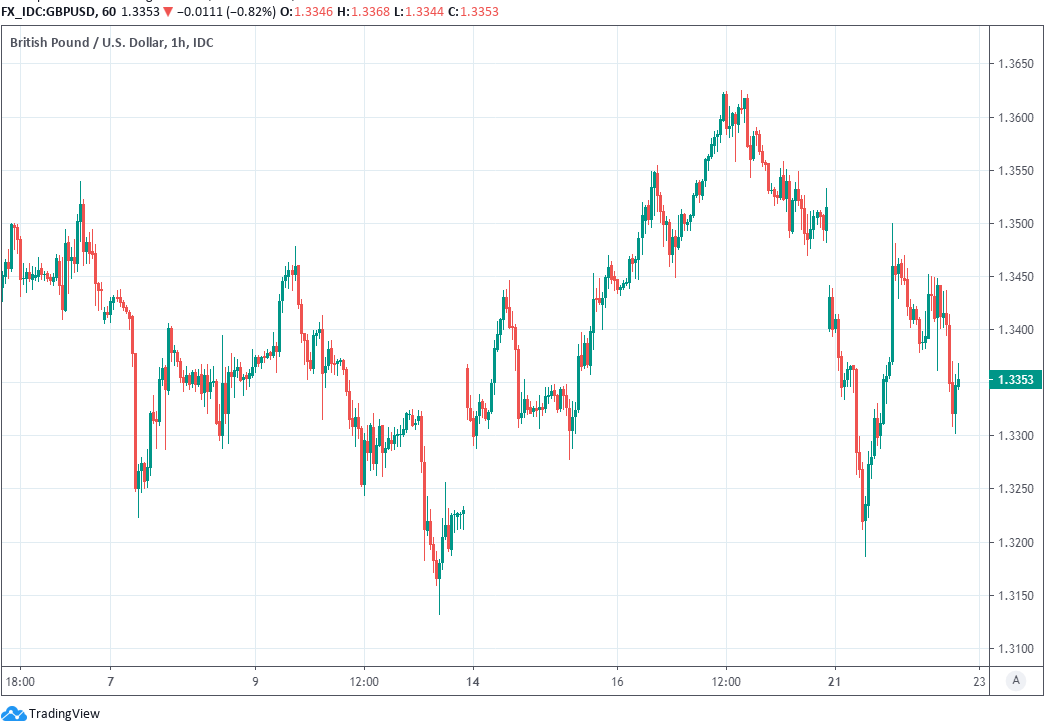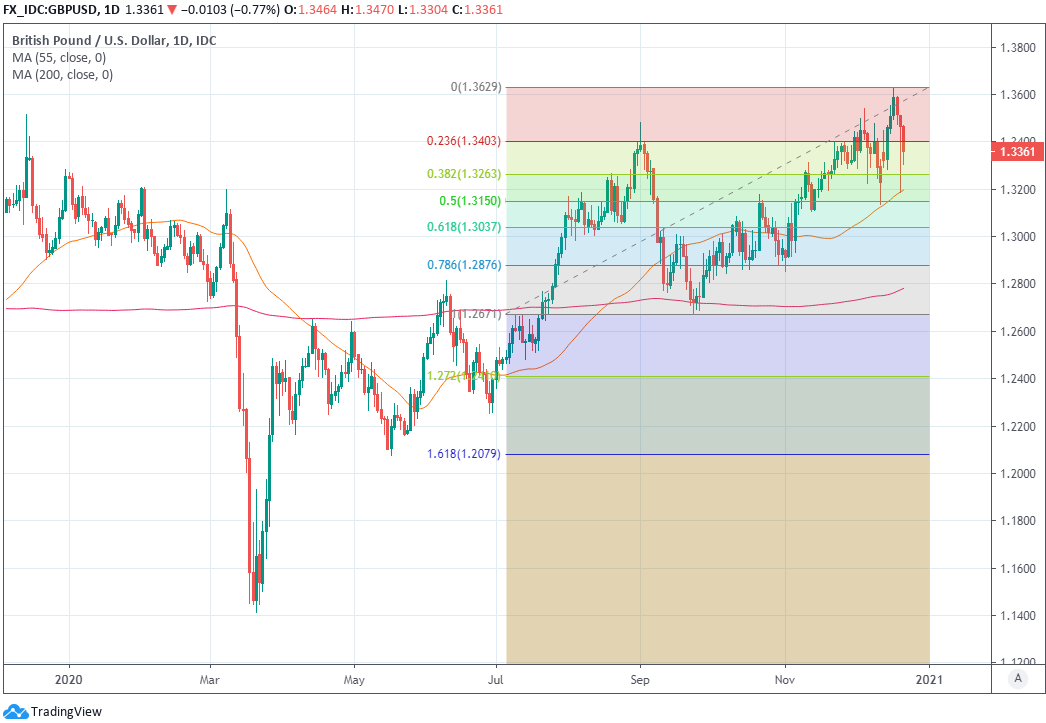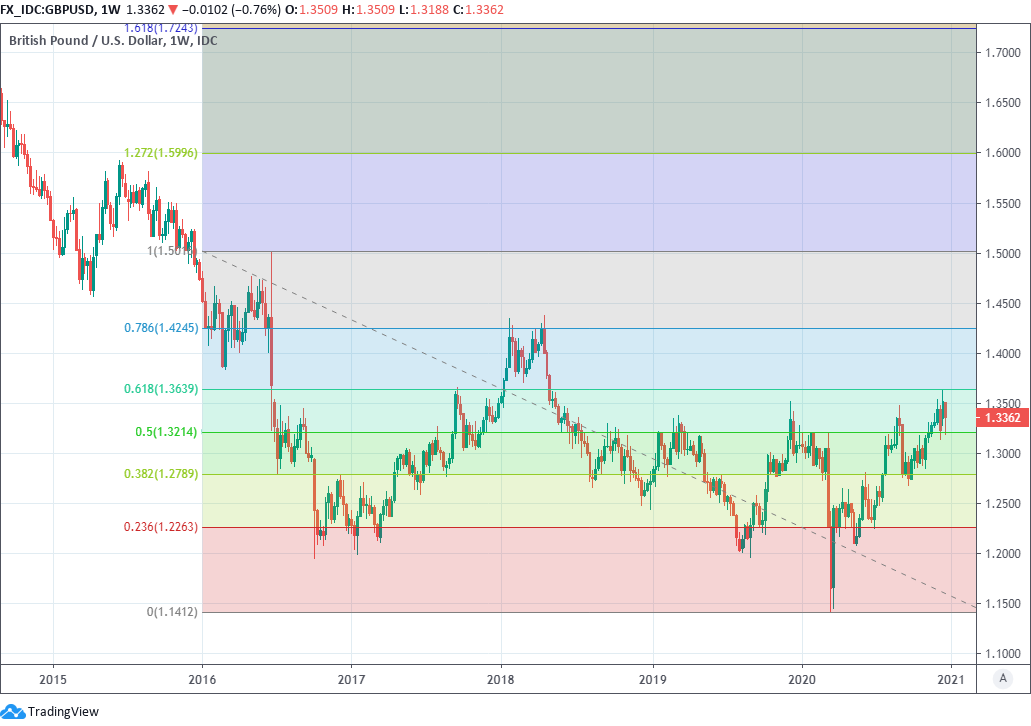Pound-Dollar Rate Played Like A Ping Pong Ball as Brexit Risks Proliferate
- Written by: James Skinner
- GBP/USD volatile between 1.33, 1.3450 as Brexit clock ticks.
- Two sides edge toward deal as ratification risk enters picture.
- Limited time for scrutiny may risk abstentions by Brexit MPs.
- Could see 'no deal' risk rising, GBP falling at the final furlong.

Image © Adobe Stock
- GBP/USD spot rate at time of writing: 1.3361
- Bank transfer rate (indicative guide): 1.2993-1.3087
- FX specialist providers (indicative guide): 1.3161-1.3267
- More information on FX specialist rates here
The Pound-to-Dollar exchange rate was played like a ping pong ball on Tuesday as traders responded in illiquid markets to the ebb and flow of Brexit headlines while time slipped away from negotiators, although increasingly, it could Conservative Party MPs who're the greater risk to Sterling.
Sterling was close to the bottom of the major currency pile again as reduced trading volumes, illiquidity, risk aversion and a rising U.S. Dollar formed the backdrop to the final days of the Brexit trade negotiations which are widely reported to be concerned almost entirely with differences over fisheries access.
The Pound-to-Dollar exchange rate traded like a ping pong ball having been batted back and forth between 1.33 and 1.3450 after recovering from Monday's coronavirus-inspired lows near 1.3250, although this volatility appeared set to continue through the holiday week.
"Buffeted by USD strength yesterday and Brexit concerns rising and falling and rising again (today, the EU has rejected the latest UK concession on fisheries), GBPUSD has proven very volatile and will likely remain so until we finally know what shape the Brexit situation takes into year-end," says John Hardy, head of FX strategy at Saxo Bank. "The 1.3500 level is the fulcrum here but we’re likely to be in a very different place in a month’s time, whether higher or lower."
The two sides have barely more than a week until the end of the Brexit transition period ends on December 31 and the UK defaults to doing business with the bloc according to World Trade Organization (WTO) rules and with Most Favoured Nation tariff rates in effect. However and in reality, there's even less than this given that it takes days if-not longer for a new bill to become law.
Above: Pound-to-Dollar rate shown at hourly intervals.
One of Sterling's problems in the short-term is that the UK and all of the EU's parliaments will need to ratify any agreement before it can come into force, which means there's a chance that even if negotiators are able to overcome the last remaining hurdles in the talks, the Pound may still suffer short-term losses if it begins to look likely that ratification will not be possible until the New Year.
"Price action remained in a much tighter band this morning and far from its low in the upper 1.31s," says Shaun Osborne, chief FX strategist at Scotiabank. "Compromise on fisheries does mean an agreement is nearing, but we remain skeptical that negotiators will come to a resolution on the remaining key matters before year-end (or at least the legislative year-end)—we anticipate Cable weakness to persist."
Brexit-supporting lawmakers in the UK have already indicated that they'd be reluctant to give their seal of approval to anything agreed by Prime Minister Boris Johnson without first having had time to "go through it with a fine-tooth comb." It's expected that any agreement would run to thousands of pages of legal jargon, likely making it impossible to scrutinise in a simple matter of days, and under these circumstances it's possible that some of the government's MPs abstain in any immediate parliamentary vote.
Above: GBP/USD at daily intervals with Fibonacci retracements of September rally, key moving-averages.
"If the EU will not accept that we are now a fully independent sovereign state then there is unlikely to be a deal anyway and we will simply trade on Australian/WTO terms instead, much as most of the world does successfully already. If there is a deal, however, the European Research Group will do exactly what it says on the tin – and thoroughly scrutinise it, against an acid test: Does it really guarantee our future sovereignty, or not?," writes Mark Francois, MP and chairman of the European Research Group, in The Telegraph.
Subject to the degree of abstention among MPs, or rejection, this could leave Prime Minister Johnson at the mercy of the anti-Brexit opposition Labour Party. Furthermore, and depending on the extent of any compromises contained in an eventual accord, Johnson may struggle to garner sufficient support for the pact within his own party after MPs have had time to review it. This may be particularly pertinent now the two sides are no longer at loggerheads over the so-called level playing field terms demanded by Brussels.
"When we finally got a referendum in 2016 the majority agreed that continued membership of the EU was incompatible with a flourishing UK democracy based on Parliament and the ability of people to sack incompetent or unpopular governments in regular General elections. Today it is most important that we make a decisive move to accountable democracy by the way we handle our exit," writes John Redwood, MP for Wokingham, on Tuesday. "Leave voters did not vote to have an Agreement with the EU that recreates the legal ties and obligations of membership. You do not have to accept EU laws to trade with them, as the USA, many smaller independent countries and China can affirm."
Above: Pound-to-Dollar rate shown at weekly intervals with Fibonacci retracements of referendum-inspired fall.







